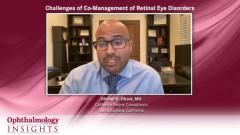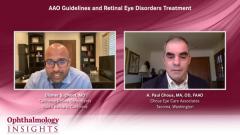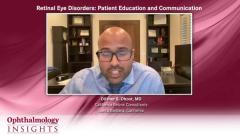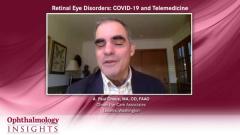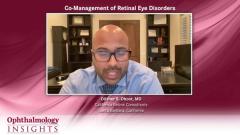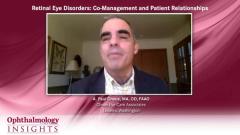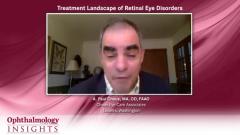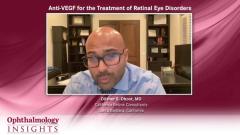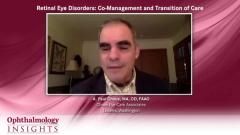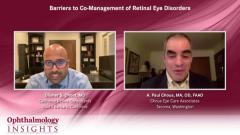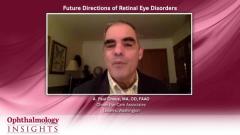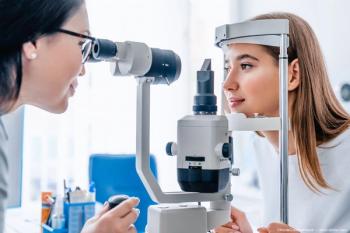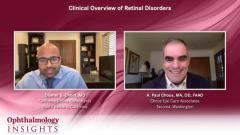
Future Directions of Retinal Eye Disorders
Dilsher S. Dhoot, MD, and A. Paul Chous, MA, OD, FAAO, discuss future directions and unmet needs in the field of retinal eye disease.
Episodes in this series

A. Paul Chous, MA, OD, FAAO:Dr Dhoot, looking into the future, what directions do you want to see the field move toward in terms of treating retinal disorders?
Dilsher S. Dhoot, MD: The future is bright. We touched on various pharmacotherapy evolving pipeline that we have. It’s an exciting pipeline with things like gene therapy and surgical management of these disease conditions. We have a bright future. As far as understanding the treatment of retinal disorders, the field is moving in the right direction. We’re sharing the care and picking up on disorders earlier. We can treat patients in an earlier timeframe, maintain good vision, and keep patients as functional as they can be. We’ve touched on durability. In general, the collaboration with optometry and retina specialists, if we continue to grow it, will continue to be beneficial for patients.
A. Paul Chous, MA, OD, FAAO: Yeah, I agree. It’s a good idea. A couple of the most insightful talks that I’ve given have been with a retina specialist and an endocrinologist or somebody in another specialty outside eye care. It’s good for other professions to see the eye-care professions working together. Family docs or endocrinologists know it’s OK to start with an optometrist for patients with diabetes, that we generally do a good job of evaluating patients, at least for the presence of severe disease. I’d like to see more of that.
I’d like to see more research collaboration. Not all optometrists or ophthalmologists want to do clinical research, but if we can get optometrists in the loop around things from DRCR [diabetic retinopathy clinical research] and the retina studies, that would be useful. The more we hang out in rooms with one another, learning about new therapies, that’s good. I know the academy of ophthalmology has not been a big fan of having optometrists at their meeting, and I understand the competitive pressures. I don’t see any of those competitive pressures between optometry and retina, but the bottom line is that we’re all on the same side, right? We want our patients to see well. We want to preserve vision. I want to do what I’m good at doing, not what I’m not good at doing. The more we can all hang out together at conferences and the like, that will be beneficial moving forward into the future.
Dilsher S. Dhoot, MD: Yes, 100%. It helps us foster the relationship. We try to do local events, we get to have a great collaborative environment at those events, and we try to keep it free-flowing so the participants can ask questions. That all helps foster that relationship. I fully agree.
A. Paul Chous, MA, OD, FAAO: This has been, from my perspective, a wonderful conversation. We’ve covered all the points that were suggested to talk about. Do you have any closing comments or final thoughts for our audience?
Dilsher S. Dhoot, MD: I’ve appreciated the discussion with you. There have been a lot of great insights. Retina, of course, is the most fascinating part of ophthalmology. We have a great field, and we’ve evolved in terms of the technologies we have, whether it’s imaging, medications, or even surgical advances. Collaboration with optometry is very important. You guys are on the front line, and it’s great for our patients that we have a collaborative team approach when it comes to them.
A. Paul Chous, MA, OD, FAAO:I totally agree. When I got out of grad school, it was like, “If you have to see the retina specialist, you’re at the end of the line for care.” We didn’t have fabulous treatments then, but we do now. The whole field of retina has evolved so much in the 30 years I’ve been practicing, and it’s a pleasure to interact with you. Thank you so much.
Dilsher S. Dhoot, MD: Thank you.
TRANSCRIPT EDITED FOR CLARITY
Newsletter
Don’t miss out—get Ophthalmology Times updates on the latest clinical advancements and expert interviews, straight to your inbox.


